Lawsuits Impacting the Civil Area: November 2021
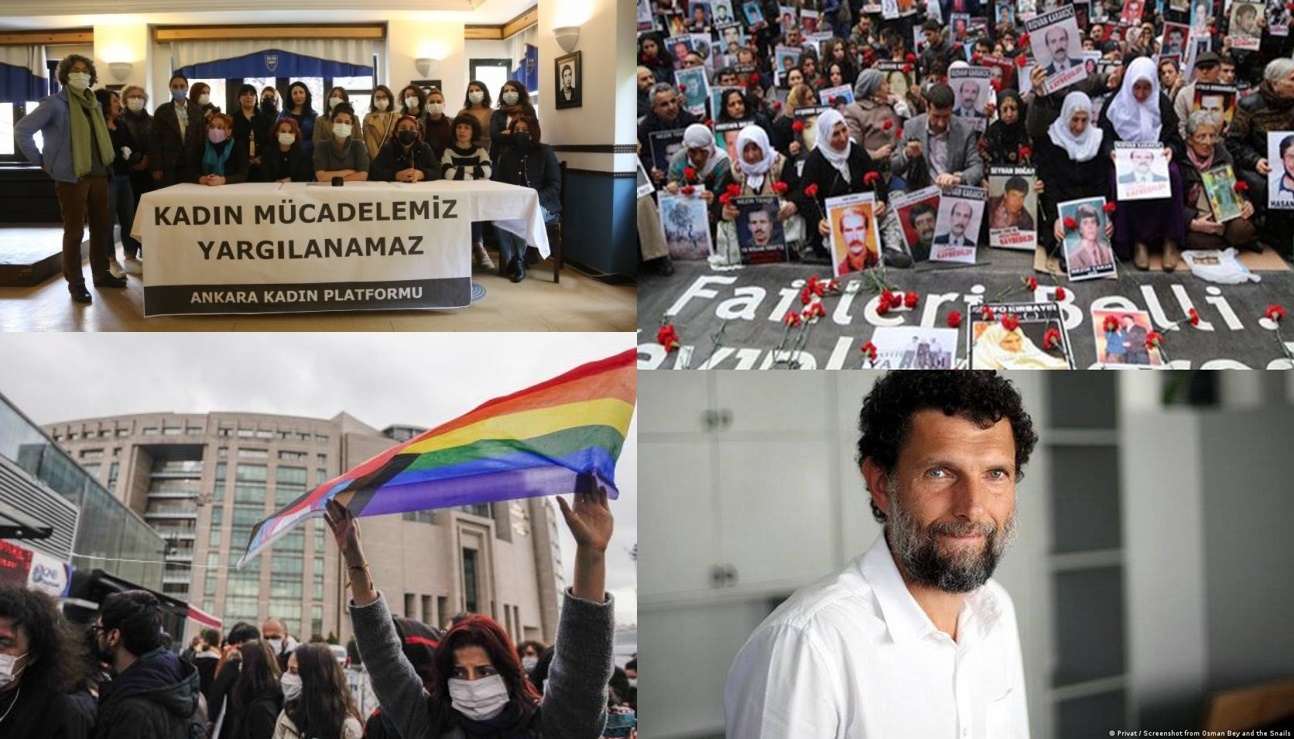
In recent years, we have witnessed that many cases with ongoing judicial processes directly or indirectly affect the civil area. We have prepared a new file that we will regularly follow up on important cases that have negative effects on the shrinking civil space in various ways and in different areas of rights. In the first of the file, we deal with the Gezi Case, Saturday Mothers, Ankara Women's Platform and Boğaziçi University Exhibition Case, which were joined with Çarşı.
In the first article of the file, we primarily deal with the bag case combined with the Çarşı and Gezi case last week, in which we often emphasize the pressure it creates on the civil area.
Joined Gezi Case: Kavala Not Released Despite the Possibility of Sanctions by the Council of Europe
In the second hearing of the new lawsuit, which was opened by combining the Gezi and Çarşı cases, at the 13th High Criminal Court on November 26, 2021, the release request of businessperson Osman Kavala was rejected with the annotation of a member. The next hearing of the case, in which 52 people are on trial, including Kavala, the only person on trial as a prisoner, will be held on January 17, 2022. Kavala is on trial for ‘attempting to overthrow the constitutional order’ and ‘political and military espionage’ and has been in detention for 4 years.
Importance of the Case: What Does Kavala’s Continuation of Arrest Mean?
After the first hearing held on October8, NGO representatives commented on the pressure on civil society created by Kavala’s continued detention.
As a matter of fact, Osman Kavala, in an interview he gave before the hearing, regarding his trial for being accused of espionage due to his civil society activities, said, ‘Not only the accusation of espionage, but the entire arrest process can be characterized as a warning to civil society activists. In the indictment, the fact that Anadolu Kültür (Anatolia Culture), of which I am the Chairman of the Board, carried out cultural studies related to the experiences of our Kurdish and Armenian citizens, and that it cooperated closely with foundations from Europe were described as facts pointing to espionage. The inclusion of such an accusation in the indictment, which must be prepared in accordance with legal norms, the acceptance of this indictment by the court and the approval of the detention application, undoubtedly shows that a new threat has emerged for NGOs as well.’
The continuation of Kavala’s detention also means that Turkey does not act in accordance with the rules of international law. As will be remembered, the European Court of Human Rights (ECHR) declared on 10 December 2019 that Kavala’s detention was a violation of his rights and that he should be released. After the ECHR decision was not implemented by the judicial organs in Turkey, the Committee of Ministers of the Council of Europe, which oversees the implementation of the ECHR decisions, gave Turkey time to release Kavala until 30 November 2021.
The fact that Kavala was not released again in the hearing held a few days before the expiry of this period shows that Turkey continues to insist on not fulfilling its obligations in accordance with the norms of international law. Therefore, there is a possibility that a sanction process will begin, with consequences ranging from the suspension of Turkey’s membership to the Council of Europe to its expulsion from the Council of Europe.
According to jurist Kerem Altıparmak, ‘There is nothing legal to say about the Kavala case’. Altıparmak states that the possibility of Turkey preventing the initiation of the infringement procedure by convincing 14 of 46 countries in the Council of Europe depends on its lobbying power.
Suggestion: In the Öte Beri Yeniden program called ‘Dirayetle Adaleti Aramak’ (Astutely Seeking Justice), the multi-layered dimension of Kavala’s trial process is discussed with its domestic and foreign political dimensions.
In addition, Gökçer Tahincioğlu’s news analysis of ‘The Kavala File in 40 Questions’ makes the complex trial process more understandable by handling the process with its important turns.
Judicial Process
- Kavala was detained on October 18, 2017, and arrested on November 1, 2017, on charges of ‘attempting to overthrow the government or prevent it from performing its duty’ (Article 312) and ‘attempting to overthrow the constitutional order by using force and violence’ (Article 309). In other words, the Gezi events and the July 15 coup attempt are considered together in Kavala’s file.
- Kavala was released in October 2019 from the investigation launched due to July 15 while he was on trial in the Gezi Case. Despite this, he was not released again, as he was imprisoned in the Gezi Case at that time. Because the Istanbul 30th High Criminal Court ruled for Kavala’s release on February 18, 2020, but before Kavala completed the release process, the Istanbul Chief Public Prosecutor’s Office made a new detention decision for Kavala, citing the July 15 coup attempt investigation, and he was arrested again.
- On October 8, the Istanbul 13th High Criminal Court started the retrial process in the new bag case, which was created by combining the Espionage (Kavala – Barkey), Çarşı and Gezi cases. In this case, Kavala is facing two aggravated life sentences on charges of espionage and financing Gezi. In the case, together with Kavala, 51 more defendants are on trial.
- In the first hearing of the Gezi trial, which was turned into a ‘bag case’ after the decision to combine the Gezi and Çarşı cases, at the 13th High Criminal Court on 8 October 2021, it was decided to continue the detention of Osman Kavala.
- A few weeks after this decision, on October 22, 2021, Kavala announced that he had decided not to attend the hearings as ‘a fair trial was not possible under these circumstances’ and that it would be meaningless for him to make a personal defense. As a matter of fact, Kavala did not attend the second hearing held on November26.
- The next hearing of the new ‘bag case’ filed after the re-trial Gezi trial was merged with the Çarşı trial, whose acquittal was overturned by the Supreme Court, will be held on January 17, 2021.
- Details on Kavala’s judicial process are available at https://osmankavala.org/tr/.
Saturday Mothers Case: From the 25-Year-Old Rights Struggle to the Trial
The third hearing of the trial of the Saturday Mothers, who have been fighting for their rights for 25 years, was held on 24 November 2021 at the Istanbul 21st Criminal Court of First Instance. Relatives of the disappeared, rights defenders and journalists are among the 46 defendants on trial. At the hearing, the refusal of the judge and the requests to withdraw from the case were rejected. It was decided that some defendants who could not attend the hearing were brought by force. The next hearing of the case will be held on March 23, 2022.
Importance of the Case
Saturday Mothers have been exercising their freedom of expression and peaceful assembly by holding banners in Galatasaray Square since 1995.
At the 700th meeting (26 August 2018), which is held every Saturday in front of Galatasaray High School for the relatives of the disappeared, 46 people are on trial for ‘not dispersing despite a warning by attending unlawful meetings’.
The Saturday Mothers, consisting of people searching for the relatives of the disappeared in custody, came together in its 870th week (27 November 2021) and made a public statement that ‘in the case that aims to discourage anyone who claims rights and freedoms’, demanded their acquittal on the grounds that ‘despite exercising the right to peaceful assembly and protest, they are prosecuted for acts that do not constitute crimes under the law’, which is a constitutional right.
Ankara Women’s Platform’s Istanbul Convention Protest Case
The second hearing of the trial of 33 women detained in protest action by the Ankara Women’s Platform against Turkey’s withdrawal from the Istanbul Convention was held at the Ankara 28th Criminal Court of First Instance on 26 November 2021. A prison sentence of 1 year, 6 months to 3 years is sought for 33 women on charges of ‘violating the Law on Meetings and Demonstrations’ numbered 2911.
Importance of the Case
Organized by the Ankara Women’s Platform last year, the ‘Istanbul Convention Keeps You Alive! We do not give up our rights, we meet in the chain of life’, 33 women who were detained in the protest state that ‘they were prevented from exercising their constitutional rights on the day of the incident, and that they were exposed to police intervention as soon as they started the protest’.
The case is handled within the framework of women’s rights defenders’ ‘right to peaceful protest and demonstration and the denial of this right’.
Judgment Process
While the Ankara Women’s Platform was holding a protest at the College on August 12, 2020, against Turkey’s withdrawal from the Istanbul Convention, the police intervened and detained 33 women. The trial began on June 7 of this year.
Boğaziçi University Exhibition Case
The 3rd hearing of the case, which was opened on the charge of ‘provoking the public to hatred and hostility’ by 7 students due to the ‘laying out the Kaaba figure painting’ on the Boğaziçi University campus, was held on 17 November 2021 at the 21st Criminal Court of First Instance. The students’ requests were denied. The next hearing will be held on February 9, 2022.
Importance of the Case
The Boğaziçi University Exhibition Case and the discussions that ‘the Shahmaran figure was replaced with the Kaaba image and there were LGBTI+ flags in the corners of the work’ were widely covered in the media.
In the indictment prepared against 7 students, it was stated that placing the LGBTI+ flag on the Kaaba image is ‘an image of homosexuality and similar sexual orientations, which are considered forbidden and haram in Islamic religious literature’, and that the figure of the hawk is contrary to ‘Islam’s belief in Allah, the only creator, and belief in Tawhid’ is included.
Based on these determinations in the indictment, the fact that both images were placed on ‘a painting depicting the Kaaba, which Islam and Muslims regard as the holiest place and structure on earth’ and exhibited at the Boğaziçi demonstrations, is ‘provoking to hatred and enmity’.
Judgment Process
The trial of 6 Boğaziçi University students and 1 student from another university on the charge of ‘openly inciting the public to hatred and enmity’.
Boğaziçi University Rectorate Prof. During the protests held during the appointment of Melih Bulu, 7 students were charged with ‘openly inciting hatred and enmity’ against 7 students by ‘putting the artwork with the Kaaba figure and LGBTI+ flag on the ground’ in the exhibition organized by the students on January 30, 2021. A lawsuit was filed demanding imprisonment of up to one year.
An investigation was launched for the crime of ‘openly insulting the religious values adopted by a section of the public’. While five university students were detained in connection with the incident, 2 students were arrested in the court, and it was decided to release two students under house arrest. Two students who were detained within the scope of the case were released at the first hearing held on March 17, 2021.

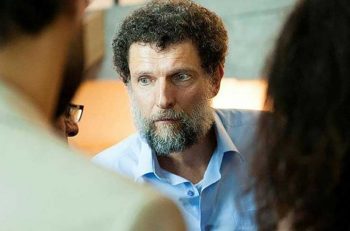
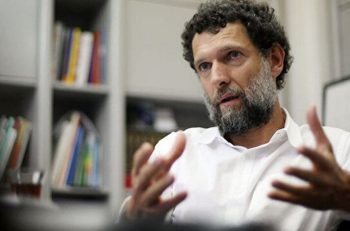
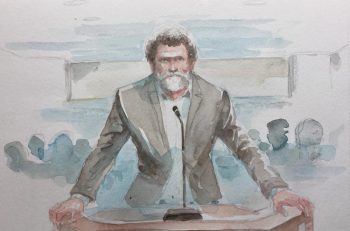

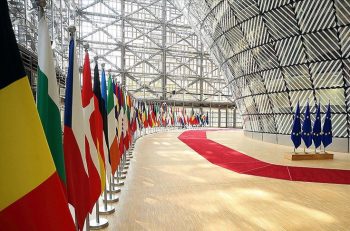

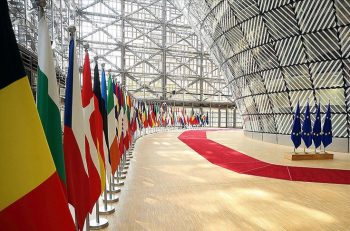
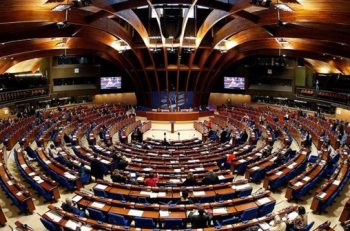
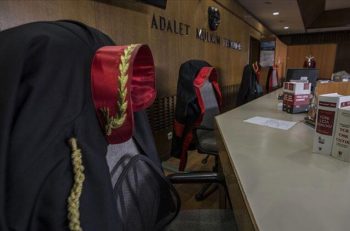

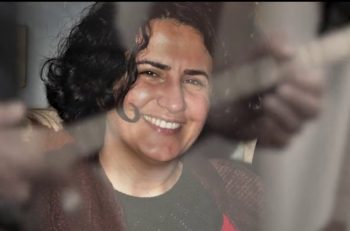
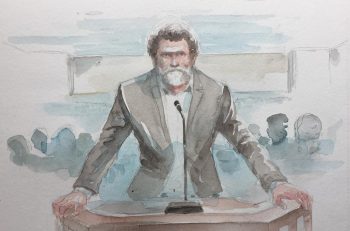
Bizi Takip Edin